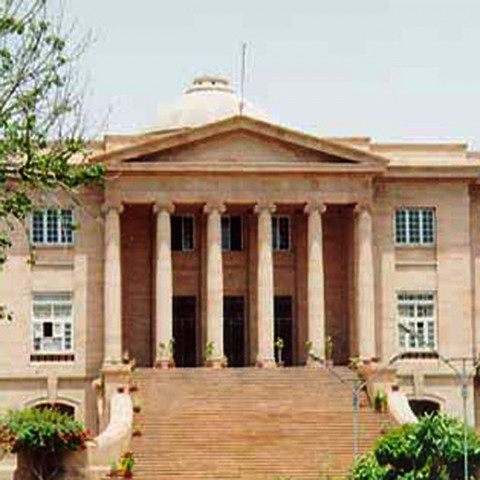Sindh High Court: ‘CM has no say in medical college admissions’
Students scoring 39 per cent in entrance tests admitted, judges question CM powers with medical colleges admission.

Sindh High Court: ‘CM has no say in medical college admissions’
The bench comprising Chief Justice Sarmad Jalal Osmany and Justice Salman Hamid was hearing arguments in three identical petitions filed by Imdad Ali, Ufera Memon and Shama Zehra, who moved the court against the Sindh health secretary and principals of Chandka Medical College, Larkana and Peoples Medical College, Nawabshah.
The petitioners stated that the Sindh chief minister, Syed Qaim Ali Shah, had allowed them to convert the overseas seat (for students living outside Pakistan) to a local self-finance seat. Overseas students have to pay US$7,000 to US$10,000 per year while students seeking admission on the local self-finance basis have to pay Rs200,000 per year. To avoid paying in dollars, the petitioners appealed to the Sindh chief minister.
They said the chief minister allowed the conversion but a section officer at the university was obstructing the orders.
The court, however, was not impressed with this line of reasoning.
What powers does the CM have in connection with admission to medical colleges, questioned the judges. They observed that the chief minister does not have any command over the quota or seats to medical colleges because this would give room to corruption and favouritism.
However, before the court dismissed the petitions, it discovered that students with abysmal marks were getting admissions in the colleges.
Officials of the medical colleges were unable to explain why a benchmark was not fixed for entrance test candidates and how the petitioners, one being at serial number 118 and the other at 438 in the merit list, were given admissions in the first place.
Representative for the medical colleges and Additional AG Sarwar Khan had differing statements.
Khan said that according to the Pakistan Medical and Dental Colleges guidelines, candidates must score at least 60 per cent in the admission tests. However, the college representative told the bench that there is no such guideline fixed for entry tests. General merit is determined on the basis of a formula, in which matric results have a weightage of 10 per cent, intermediate science subjects 40 per cent and entry test results 50 per cent.
While eyebrows were raised in the courtroom, no further decision was made on the low-percentage results of the petitioners.
After going through the prospectus and other documents of the colleges and hearing both counsels’ arguments, the bench disposed off the petition, asking for three months time to submit the fee in US dollars. The petitioners have to pay the full tuition fee as per the overseas admission requirement. In case of a default, the colleges were allowed to take action against them as per their own policy.
Published in The Express Tribune, December 2nd, 2010.


















COMMENTS
Comments are moderated and generally will be posted if they are on-topic and not abusive.
For more information, please see our Comments FAQ